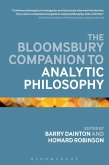Making extensive use of unique archival resources this collection presents, for the first time, an in-depth study of the work and influence of Wittgenstein's original literary heirs, Rush Rhees, Elizabeth Anscombe and Georg Henrik von Wright as editors of Wittgenstein's posthumous writings.
Presenting philosophical portraits of Rhees, Anscombe and von Wright, a team of international contributors provide a history of their collaboration and discuss how the individual philosophical views of the literary heirs shaped what we now know as the works of Wittgenstein. They consider the link between philosophically relevant aspects of their biography, their friendship with Wittgenstein and the development of their philosophical personalities, offering us a new appreciation of the dynamics of their editorial collaboration and how each of the heirs worked individually as an editor to create Wittgenstein's philosophy.
Each chapter reveals what the editors did to enrich and shape our understanding of Wittgenstein's philosophical contribution on topics such as rule-following, logical necessity, aesthetics and the methods and aims of philosophy. This thorough critical analysis of the editorial history of Wittgenstein's works allows us to finally appreciate the profound impact the editors have had on our understanding of his philosophy, his views and his cultural significance.
Presenting philosophical portraits of Rhees, Anscombe and von Wright, a team of international contributors provide a history of their collaboration and discuss how the individual philosophical views of the literary heirs shaped what we now know as the works of Wittgenstein. They consider the link between philosophically relevant aspects of their biography, their friendship with Wittgenstein and the development of their philosophical personalities, offering us a new appreciation of the dynamics of their editorial collaboration and how each of the heirs worked individually as an editor to create Wittgenstein's philosophy.
Each chapter reveals what the editors did to enrich and shape our understanding of Wittgenstein's philosophical contribution on topics such as rule-following, logical necessity, aesthetics and the methods and aims of philosophy. This thorough critical analysis of the editorial history of Wittgenstein's works allows us to finally appreciate the profound impact the editors have had on our understanding of his philosophy, his views and his cultural significance.









